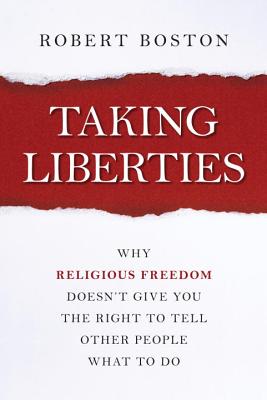I am a card-carrying member of the American Civil Liberties Union and Americans United for Separation of Church and State. Robert Boston (Twitter) is the latter organization's Director of Communications, and he is the author of numerous books. His latest is Taking Liberties: Why Religious Freedom Doesn't Give You the Right to Tell Other People What to Do. I was fortunate enough to be able to attend a talk he gave in Augusta, GA, and I enjoyed his company at lunch before the talk.
I read this book as part of the Establishment Clause Book Club, sponsored by my local branch of Americans United. The book does an excellent job at showing how many of the current culture war skirmishes are attempts by old guard white Christian authorities to assert privileges society used to grant them, such as control over sexuality and education. With changes in social norms, people no longer want these factions to make decisions for them, and they have voted and courts have ruled that they don't have the right to use government to enforce their norms on others.
For example, when public schools first began in the United States in the 19th century, Protestant versions of the Bible were part of the curricula. Later, as Catholics asserted their right not to have their children in public schools exposed to religious beliefs they opposed without a compelling state interest, politicians and judges changed public school policies to prohibit government establishment of religion in public schools. Similar stories can be told in relation to government supported art, medical facilities and employment.
For the targeted audience of this blog, the book does not address some concerns. In particular, how should a religious minority know when it should request a government or private entity to accommodate a religious practice? The best example I remember was the request of Muslim taxi drivers in Minneapolis/St. Paul to divert passengers carrying alcohol to other cars while maintaining their place in the taxi queue. I believed that accommodating the drivers' request was reasonable, but the agency regulating taxi transportation at the airport, after public input overwhelmingly against any accommodation of the drivers' request, decided not to do so.Today, after seeing where others have gone with the idea of denial of service based on religious preference, I believe that the drivers' request should not have been accommodated, although I still sympathize with them as laborers asserting dignity in their workplace and I condemn much of the rhetoric surrounding this incident as inflammatory, racist and Islamophobic.
Many establishments of majority religion are not recognized as such. The best example of this is the work week, Monday through Friday, and the scheduling of holidays. Muslim religious practices related to burial or slaughtering of animals for meat may conflict with local regulations, not out of a compelling public interest but simply because the regulations reflect the majority's sensibilities at the time of their enactment.
Prisons present numerous problems in religious accommodation, some of which may be due to administration disregard of Muslims' requests and some of which may be due to legitimate security concerns.
Another policy that to me can only be explained by the European Christian religious inheritance of the dominant groups in the United States is the prohibition of polygamy. Nevertheless, advocating for legalization of polygamy is not an issue I see as deserving of Muslims' political efforts.
Another question in my mind is whether the First Amendment can be extended into U.S. security policies. For example, shouldn't police targeting of Muslims be a violation of the Free Exercise Clause? Shouldn't U.S. aid to Israel, a country privileging people of one religion over others, be recognized as a violation of the Establishment Clause? I'm sure these policies are, in current legal doctrine, far from the purview of the First Amendment. Yet political pressure, over time, can change legal doctrine.
I urge Muslims to learn about the Establishment and Free Exercise Clauses of the First Amendment because they are the reason we are able to enjoy a quality of life in the United States as Muslims. We should be vigilant in challenging unwarranted establishments of religion by non-Muslims and wise in distinguishing which of our religious practices are morally sound, religiously important and needing public accommodation. We should be assertive in requesting accommodations for those and search for less politically divisive alternatives for religious practices which don't meet those criteria.
An important lesson from this book is that courts, which have had the same U.S. Constitution for two hundred years, did not move religious freedom forward, but people's changing beliefs and their ability to translate those beliefs into political action did. The book is a fast, easy, flowing read and a good introduction to contemporary "religious freedom" claims.
Updated August 7, 2014: At the discussion of the book yesterday, one woman who grew up in Wilkes County in northeastern Georgia claimed that none of the Religious Right's objections to public education began until racial integration.
I had forgotten about the Satanic backmasking messaging in US popular music. Rob Boston cites this as an example of the Religious Right's attempts at imposing its cultural standards. My first real exposure to the names of heavy metal and stadium rock bands of the 1970s was listening to a preacher on tape decrying their influence. Rock on, man!

